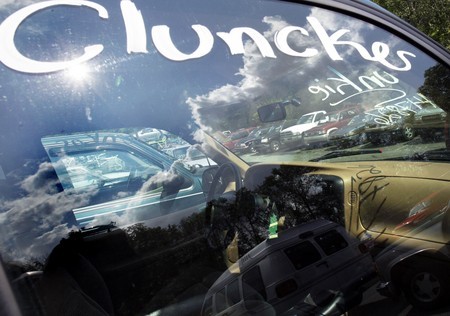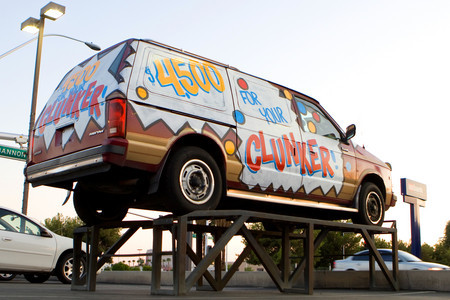Dealers’ fears eased as money comes in for ‘Clunkers’ deals
New-car dealers in Southern Nevada no longer are gnashing their teeth and losing sleep because the government has started sending them big wads of money for "Cash for Clunkers" deals.
Dealers had worried that they might get stuck having to keep some of the vehicles they accepted under the government program.
The program let dealers give former clunker owners credit for up to $4,500 in government rebates, although many dealers worried that the government might refuse to reimburse them because of regulatory issues.
"I sleep better at night knowing that money is flowing," said Tyler Corder, chief financial officer of Findlay Automotive Group, which owns 21 dealerships, including 14 in Southern Nevada.
As of Friday morning, Findlay had received payment or approval for payment on 86 percent of its "Cash for Clunkers" deals.
Jim Marsh Automotive has been paid for 90 percent of its "Cash for Clunkers" deals, and the government has reimbursed Gaudin Ford and Ford Country for a similar percentage of deals.
U.S. Transportation Secretary Ray LaHood told the National Automobile Dealers Association that 478,000 of the nearly 700,000 car vouchers that U.S. dealers submitted have been paid, or about $2.4 billion.
An additional 87,470 applications have been approved and are awaiting payment from the $2.8 billion auto stimulus plan. Transportation officials said about 60,000 dealer applications worth about $250 million have been rejected.
Dealers said the program was good for their businesses, if not necessarily the country.
The Findlay dealerships counted 641 "Cash for Clunkers" transactions. Gary Ackerman, owner of Gaudin Ford and Ford Country, tallied 110. Marsh took 25 clunkers in new-car deals.
Ackerman studied the demographics of "Cash for Clunkers" customers and was surprised to find they had stronger-than-average credit scores.
"These were very intelligent people who manage their money well and had put off buying a new car for very good reasons," Ackerman said.
He said he believes the "Cash for Clunkers" program looked too good for these customers to ignore.
Passenger vehicle transactions were the most common clunker transactions, he said, noting that pickup truck owners are less concerned about gasoline mileage.
The government program helped Marsh sell its inventory of 2009 vehicles and make room for 2010 models, sales manager Mark Grim said.
He added that the hottest product now is the Kia Soul, a small sport utility vehicle crossover with a base price of around $13,000.
"They are selling as fast as we can get them," Grim said. "It's a nice product for the market.
"(Overall) sales have slowed down a little bit since the end of the program," Grim said. "We anticipate the sales picking back up with 2010 models hitting the ground now."
Others were more cautious.
"Business is worse in September than anytime before C4C," Ackerman said. "We just don't know how big the hangover is going to be."
Corder wasn't sure how many of the customers who took advantage of the program were going to buy anyway and just bought earlier to get the government subsidy.
"The sales pace is much lower than it was in August," Corder said. "It's too early to tell whether that's a seasonal adjustment that we normally see or not."
LaHood said "Cash for Clunkers" boosted business.
"There can be no doubt that this program drummed up more business, for more people, in more places, at a time when we most needed the help," LaHood said.
The program took about 700,000 smoggy, fuel-inefficient vehicles off the streets, Ackerman said.
Contact reporter John G. Edwards at jedwards@reviewjournal.com or 702-383-0420. The Associated Press contributed to this report.


















